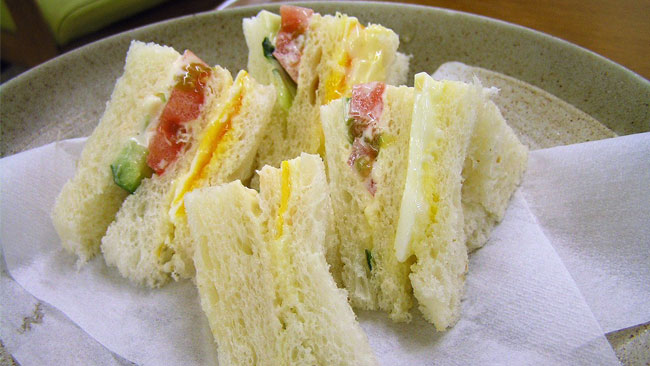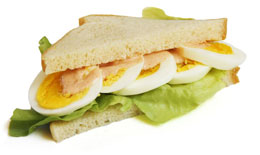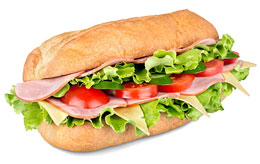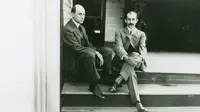What in heavens is a sandwich?
By Kiron Kasbekar | 21 Oct 2022

A sandwich is just two slices of bread with some vegetables, cheese, meat or other stuff in between.
Right?
Wrong!
This may well be the way most sandwiches are, as you will discover if you do a global census of sandwiches. But there are sandwiches that are made with just one slice, and with various slabs and strips of meat, fish or other things on top. No other bread slice above that.
 |  |
They are called ‘open sandwiches’, and their origin is traced to Scandinavian cuisine. But some people say the open sandwich was invented by a hotelier in Prague in Czechoslovakia.
I did a bit of checking, and then said, forget it, too much trouble, this is not a subject over which countries go to war. And over which I should not lose my peace of mind.
Anyone who, on an evening when the bakery was closed, was left with just one last slice of bread from the loaf, and some meat and spinach, could have made it anytime in our long history.
So let’s move on.
But, before we do, let’s ask this question. Does a sandwich have to be European in origin? I’m not a hundred per cent sure of this, but there are those who argue that if your stuff is between two slices of bread, or on top of one slice, or in a roll, then it is a sandwich only if it was first created in Europe or America.
If your snack is a roll the way Mexicans make it, or Indians, Arabs or Chinese do, then … ahem … er … sorry, it cannot be called a sandwich.
Now you will admit that if you pack a slice of meat between two slices of bread and toast them in a toaster, it is a sandwich. When you do that, the edges meld together.
You can even use boiled potatoes between the two slices of bread, instead of the meat, as I used to have many, many years ago, when I had jaundice and was on a strict no-salt diet.
But, then, why is an aloo paratha not a sandwich? After all, it is a layer of boiled, mashed and spiced potatoes between two thin parathas (i.e., rotis, which are just another form of bread, right?), and then roasted on a flat pan.
Similarly, a taco is like an open sandwich or like a submarine or ‘hero’! A taco is a type of Mexican bread, though it looks more like a stiff roti, on which a heap of vegetables, meats and sauces are added. And, yes, it is usually eaten folded.
 |  |
And a burrito is more or less the same thing, except that it is a whole lot of those things wrapped into a roll. Much like the kabob rolls you get in India or the Middle East.
And what about the Chinese spring rolls? Why should they not qualify to be included in a list of sandwiches?
We can certainly argue all these things; but nobody will listen to you.
I could also have asked why the delightful Japanese sushi dishes cannot be called sandwiches. But I won’t because they are the opposite of a sandwich. They have the fish slices outside, and rice or other stuffing inside! Mostly.
See what I mean?
So is it just European prejudice against Asians and others non-European? Maybe not. And I’ll tell you why.
If someone described aloo parathas on their restaurant menu as ‘fried potato sandwiches’, I would most likely not order it, unless some others at the table wanted it. Instead, I would ask, ‘Don’t you have aloo parathas?’
Or I might just go for a biryani. Or even a simple egg sandwich with rye bread.
I’d do the same thing with a taco or a spring roll or a plate of sushi. I’d like to call them just that – tacos or spring rolls or sushi! And I’d be happy to order them. But I’d certainly not like to ask the waiter or the steward for spring roll, or sushi, sandwiches!
So, while my first reaction to the practice of not referring to boti kabab rolls, stuffed parathas and spring rolls as sandwiches, on second thought, it’s best to just let things be.
They say, ‘let sleeping dogs lie’! I’d add: let sleeping hot dogs lie! Else we’ll have a food war on our hands.
In any case, all we can do is ask questions. Since I am not a lexicographer with the Oxford, Collins, Webster or any other dictionary, that’s all I can do.
They used to say ‘Man proposes, but God disposes.’ In this case, I can only propose. And our lexicographer gods named Oxford, Collins, and Webster will dispose of the matter if and when they deem fit.
In consequence, until God or our good lexicographers decide otherwise, we will continue to refer to stuff packed inside two slices of bread or over a single slice of bread as a sandwich. And nothing else.
And I am not disposed to propose anything else.



















